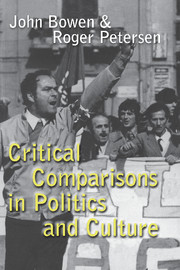Book contents
- Frontmatter
- Contents
- List of Figures
- List of contributors
- Acknowledgments
- 1 Introduction: critical comparisons
- 2 National revivals and violence
- 3 Mechanisms and structures in comparisons
- 4 Comparative methodologies in the analysis of anthropological data
- 5 The role of comparison in the light of the theory of culture
- 6 Case studies of contemporary job loss
- 7 Defining the contours of an Islamic reform movement: an essay in successive contrasts
- 8 Producing an analytic narrative
- 9 Political consciousness on Boa Ventura: 1967 and 1989 compared
- 10 Comparisons in the context of a game theoretic argument
- 11 The role of microhistories in comparative studies
- List of references
- Index of authors
- Subject index
9 - Political consciousness on Boa Ventura: 1967 and 1989 compared
Published online by Cambridge University Press: 28 January 2010
- Frontmatter
- Contents
- List of Figures
- List of contributors
- Acknowledgments
- 1 Introduction: critical comparisons
- 2 National revivals and violence
- 3 Mechanisms and structures in comparisons
- 4 Comparative methodologies in the analysis of anthropological data
- 5 The role of comparison in the light of the theory of culture
- 6 Case studies of contemporary job loss
- 7 Defining the contours of an Islamic reform movement: an essay in successive contrasts
- 8 Producing an analytic narrative
- 9 Political consciousness on Boa Ventura: 1967 and 1989 compared
- 10 Comparisons in the context of a game theoretic argument
- 11 The role of microhistories in comparative studies
- List of references
- Index of authors
- Subject index
Summary
On the basis of research conducted on a Brazilian fazenda in 1966–67 (Johnson 1971), I formulated a hypothesis concerning the emergence of class consciousness among tenant farmers in a highly class-structured society (Johnson 1975). Recent restudies in 1988–89 offer the opportunity to evaluate that hypothesis in the light of twenty-two years of significant change in the Brazilian political economy. In this paper I will illustrate the value of long-term research (field studies of the same community over many years) as a type of comparative research capable of generating and testing hypotheses of theoretical and practical importance.
I will show that the tenant farmers' political consciousness — that aspect of thought and belief relevant to political action — has changed substantially during a quarter-century of change in Brazil at large, in a direction that partically (but not entirely) confirms my original hypothesis. I will also argue that, in speaking of a change in political consciousness, we are not so much speaking of the transformation of one belief into another, as of a shift in the weights assigned to the elements of a complex of interrelated, sometimes contradictory, beliefs.
The theoretical problem
During my original field research on Boa Ventura in 1966–67 I lived for a year among forty-five households of peasant sharecroppers (moradores, or “tenants”) who raised subsistence and cash crops on land provided by a wealthy absentee landlord, in return for which they provided the landlord with shares of their harvest or days of labor as their “fund of rent” (Wolf 1966: 9–10).
- Type
- Chapter
- Information
- Critical Comparisons in Politics and Culture , pp. 173 - 195Publisher: Cambridge University PressPrint publication year: 1999



